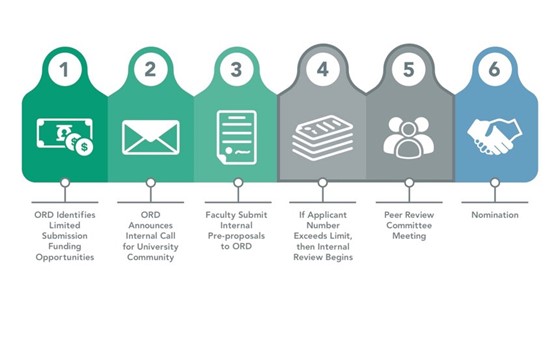What is the limited submission and review process?
Limited Submission Selection Policy:
Researchers planning to apply to a limited submission opportunity should notify ORD and submit a pre-proposal application as soon as possible.
If the number of applicants exceeds the available submission allowance, each application will enter an internal competition. The internal competition will consist of a peer review team which evaluates the pre-applications and recommends faculty teams to be cleared for submission. If fewer than the maximum available submission slots are submitted prior to the deadline, we do not host an internal competition, and faculty teams are cleared to submit on a first-come, first-served basis.

- ORD Identifies Limited Submission Funding Opportunities.
- ORD Announces Internal Call for University Community.
- Faculty Submit Internal Pre-Proposals to ORD.
- If Applicant Number Exceeds Limit, then Internal Review Begins.
- Peer Review Committee Meeting.
- Nomination.
Limited Submission 45-day Policy:
Any limited submission that is not on the calendar above and has less than 45-days before the first due date will be approved to submit on a first-come, first-served basis. Please contact limited_submission@unc.edu to verify.
Limited Submission Renewal Policy:
Priority is granted to teams seeking to renew a proposal for a limited submission. Please contact limited_submission@unc.edu to confirm renewal.
Limited Submission Selection by School Policy:
For limited submission opportunities in which the limit on the number of allowable applications is placed on individual schools (i.e. School of Medicine), each individual school is required to facilitate a selection process and internal competition of its own.
What is typically included in an internal application?
Standard application materials include:
- Biosketch or CV of PI
- Brief Project Description (4 pages unless award specifies differently)
- List of potential collaborators (internal and external to UNC)
- Names of three internal (to UNC) faculty who could speak knowledgeably about the project, in the event of an internal review. Faculty named on the project, chairs or deans, direct reports or others who have a conflict of interest cannot serve on the internal review committee.
- Other materials specific to the requirements of the sponsoring agency

